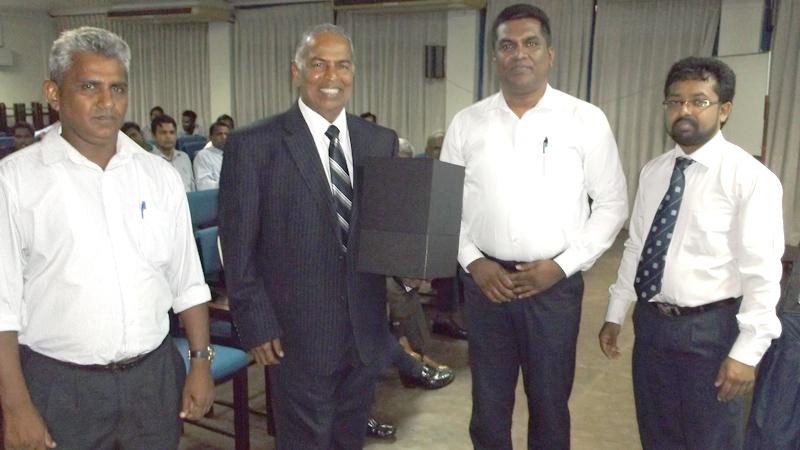
The Hambantota port has the potential to be the largest in the World. With the development in the hinterland of agro-industries, such as dairy-based and rice-based production, exporting through Hambantota, employment could be provided for engineers at world-scale salaries, Ariyaseela Wickramanayake told a seminar on ‘Entrepreneurship’, organised by the Private Sector Engineers’ Society at the Plastics and Rubber Technology Institute auditorium in Rajagiriya last week.
He told the audience of engineers, business leaders and academics that only two percent of what could be done at Hambantota had been completed so far.
A massive ship repair facility is to be built there, which would enhance the services provided. The port, lying beside one of the world’s biggest sea routes, provided an opportunity for exports far greater than Colombo, and he had been advocating its construction since 1996.
Detailing his experiences since he was a young man involved in the diving business, he said that he had established his first company, Master Divers, investing the money he had earned in Saudi Arabia.
He had been the first Sri Lankan to start a diving company. Ship owners preferred to go to Master Divers because the process of getting diving services from the government was complicated by bureaucratic procedures and liable to cause delays.
It was while involved in diving work at Kirinda that he noticed the strategic importance of Hambantota. People going to Kataragama would by-pass Hambantota as fast as possible. However, he recognised its potential, and for years pressed politicians to build the harbour. As Chair of Pelwatte Sugar and later of Pelwatte Dairy Products, he believed in the possibilities of exporting alcohol and dairy products through Hambantota.
Although he had to buy milk at high prices and sell it cheap, he could nevertheless predict that Sri Lanka would shortly be self-sufficient in milk. We were already self-sufficient in butter, for which he was exploring export opportunities. China and Japan exported goods to Sri Lanka, China gave us loans, so we should ask, in return, that they buy our butter, he asserted.
Wickramanayake explained that the country imported 1.3 million tonnes of wheat, and people were eating subsidised bread instead of rice. In these circumstances, we could not be said to be self-sufficient in rice. We would be self-sufficient when we were producing enough to provide two years’ buffer stocks, and enough in excess to provide raw materials for chick-feed and alcohol production.
Sri Lanka is one of the world’s centres for safe food production, he claimed. “We did not need to add chemicals to our food. This gave us huge potential in the world market, and Hambantota provided a gateway. The proper development of the port, he believed would provide thousands of jobs for engineers. He concluded, saying that engineers have hope.”
At the conclusion of his talk, the PSES gifted him a token of their appreciation. Eng. Manjula Parakrama, the editor of the PSES newsletter, The Engineer, presented him with the first issue. He described its purpose as the communication of the essential truth of engineering to the members.
At the commencement, PSES President Eng Ananda Devasinghe introduced the event. He explained that engineers found few opportunities for employment in the public sector, so the private sector needs to step in. It is engineers who create value. Working in the private sector, they were the engine of economic growth. However, few engineers were entrepreneurs, most depending on people with far fewer qualifications for their employment, which is unhealthy. More needed to become entrepreneurs.
The PSES, he said, aims to rope in the 20,000 engineers in the private sector. There was no political agenda. Engineers managed their own affairs, didn’t make unnecessary demands, but were not properly marketing their own skills and knowledge.
The PSES aimed not just to safeguard the welfare of private sector engineers, but to create a platform to develop engineers as entrepreneurs and to play a consultative role in the development of the economy and society. The PSES intended this seminar, the second it organised, to be part of a series in which knowledge was transferred from successful innovators and entrepreneurs to the body of private sector engineers.
Eng. Hemantha Wattegedera delivered the vote of thanks.
